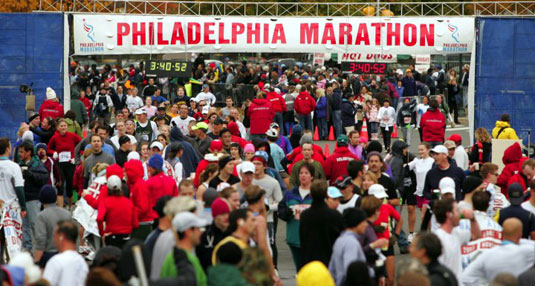Temple study finds Philadelphia Marathon pumps $15 million into local economy

A survey by Temple University’s Sport Industry Research Center has found that the Philadelphia Marathon pumped $15.4 million into the city’s economy last year and attracted thousands of affluent visitors who are likely to promote future tourism due to their high satisfaction with the event.
In a survey of participants in last year’s Philadelphia Marathon events, School of Tourism and Hospitality Management researchers Jeremy Jordan and Emily Sparvero found that 94 percent of respondents would recommend the event, while 65 percent of non-local runners said they would suggest Philadelphia as a vacation destination.
Runner demographics depict a very lucrative market for event sponsors and demonstrate the ability of the event to draw large numbers of affluent visitors to Philadelphia. Nearly 77 percent of race participants live outside the city, and more than 45 percent have a household income of $100,000 or more a year.
The average per-person spending related to the event was nearly $350. Last year, the Philadelphia Marathon events drew 29,212 visitors to the city, including 13,715 non-Philadelphia residents who participated in the marathon, half marathon or Rothman Institute 8K. Each runner, on average, was joined by 1.13 spectators.
“The Philadelphia Marathon events showcase Philly as a destination to a group of consumers who are attractive to the local economy when you have this high socio-economic group coming to our city,” Sparvero said. “Those are the people we want as visitors to boost and keep our economy going.”
Runners who participated in the 8K — generally classified by researchers as the least active participants — demonstrated a high intent to increase their physical activity after finishing the race. Among all respondents, nearly 30 percent said they planned to increase running or walking after completing the Philadelphia Marathon events.
The study results were drawn from 2,324 respondents who participated in the marathon events and completed a post-race survey online. Temple’s Sport Industry Research Center is the exclusive research partner of the Philadelphia Marathon.
The increase in economic activity connected to last year’s races was analyzed in three streams: total direct spending, indirect spending (such as business-to-business spending) and induced spending, which accounts for temporary increases in some Philadelphia workers’ incomes due to the direct spending from the events.
Researchers found that the Philadelphia Marathon was responsible for generating nearly $5.4 million in additional wages and salaries for city residents and that the event created 138 new jobs, which were likely part-time or temporary.
This year’s sold-out marathon and half marathon will be held during Philadelphia Marathon Race Weekend from Friday, Nov. 19, through Sunday, Nov. 21. The Philadelphia Marathon is one of only a few marathons nationwide owned and operated by a municipality.
“The ratio is significant in terms of what the City of Philadelphia gets back, both for the economy and the community, from their investment,” Jordan said. “We would all dream of this type of return.”